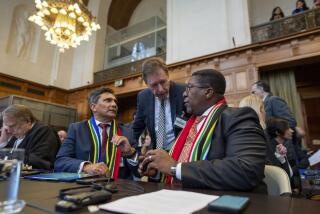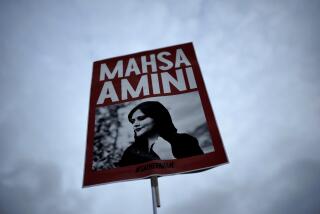Attack on Iraq funeral kills 30
The friends and family of slain Fallouja tribal leader Alawi Ahmed Zuwaid decided to ignore a threatening leaflet and honor him Thursday with a public funeral. In return, the mourners were hit with the deadliest bombing of the day in Iraq.
As the funeral procession moved through Fallouja, a suicide car bomber attacked the mourners, killing 30 and injuring 34, authorities said. They were among at least 67 Iraqis killed or found dead Thursday.
The U.S. military also announced that eight U.S. soldiers had been killed in the last three days. On Thursday, a soldier died when his vehicle struck a bomb in north-central Iraq, and another was killed by small arms fire in Diyala province. Later, the military said a roadside bomb killed two more soldiers here in the capital.
Two troops died Wednesday in Al Anbar province.
On Tuesday, a soldier died of injuries from a roadside bombing in Al Jabour, and another died of wounds from an explosion in Taji, the military said. The two deaths late Thursday added to those reported on icasualties.org bring the number of U.S. troops killed in Iraq to 3,440.
Al Qaeda in Iraq apparently had targeted Zuwaid, a 60-year-old restaurant owner, because he had cooperated with American forces in reconstruction projects, friends said. He also had helped form an alliance among tribal leaders against Al Qaeda.
On Wednesday, militants shot him dead as he arrived home from prayers, police said. His 25-year-old son was killed nearly a month ago as he walked down the street.
Zuwaid had received a letter last week warning him to stop his work as a contractor on reconstruction projects.
Hours after he was slain, another leaflet was left for his family, ordering them to have a small, private funeral.
On Thursday, the suicide bomber positioned himself near Zuwaid’s home and waited until the 150 mourners drew close.
Saad Mjbil, who saw the blast, said victims were torn to pieces, making it difficult to count or identify the dead.
Another witness, Abdul Rahman Mohammed, 40, blamed foreign Islamists. “Such crimes are not done by Iraqis,” he said. “I assure you that there are criminals who want to disfigure and desecrate the image of Islam and Arabs. Such crimes did not happen before the occupation.”
Fallouja, in the western province of Al Anbar, has witnessed a steady rate of killings in recent days, among the victims an intelligence officer, soldiers, police officers and pilots.
“They are Al Qaeda,” Abdullah Khalaf, another Zuwaid mourner, said of the attackers. “They won’t leave us alone, killing students, educators, degree holders. They are forcing female students and government employees to wear veils. We can’t do anything about it.”
In Baghdad, Prime Minister Nouri Maliki announced a slate of Cabinet ministers to replace those pulled out by radical Shiite cleric Muqtada Sadr, while south of the capital U.S. and Iraqi forces stepped up their search for two missing soldiers.
“A significant effort continues” to find them, said U.S. Army Lt. Col. Randy Martin, a military spokesman.
The body of the third soldier, Pfc. Joseph J. Anzack Jr., 20, of Torrance, was found Wednesday in the Euphrates River, 12 miles south of where he and Spc. Alex R. Jimenez, 25, of Lawrence, Mass., and Pvt. Byron W. Fouty, 19, of Waterford, Mich., were captured May 12 by insurgents.
The search, Martin said, has involved 4,000 U.S. soldiers and 2,000 Iraqi troops, who have questioned about 1,100 people, dropped 320,000 leaflets and covered 260 square miles.
In the process, the joint forces have discovered significant weapons caches used by snipers and bombers and have killed a team of snipers who attacked them, Martin said.
In the capital, militants set up a fake checkpoint in an eastern district, stopped a minibus and killed 11 people onboard. The gunmen then loaded the bus with explosives, which detonated when police and security forces arrived, killing two more civilians and injuring four.
In central Baghdad, a suicide bomber drove his car into an Iraqi army checkpoint, killing a soldier and injuring two civilians.
In the northwest part of the city, an Iraqi government official, Salim Hameed Hassan, was slain by unidentified gunmen riding in two cars.
Twenty-two bodies were found dumped throughout the city, apparent victims of sectarian death squads.
Maliki’s slate of new Cabinet members was not received well, and it appeared unlikely to quell sectarian tensions.
The Sadr loyalists had resigned from the Cabinet on April 16 at the cleric’s request, over Maliki’s refusal to set a timetable for U.S. withdrawal.
Waleed Kremawi, an official in Sadr’s political office, said Maliki’s slate was unacceptable. He charged that some candidates had been accused of corruption in the past, but he would not provide details. Maliki insisted his nominees had clean records.
Kremawi said that the parliamentary bloc allied with Sadr would probably block Maliki’s slate and that the cleric’s political office was considering alternative candidates.
U.S. officials have pushed Maliki to announce a slate that would help political reconciliation among Shiites, Sunni Arabs and ethnic Kurds and move forward on bills to address the sharing of oil revenue, revising bans on former Baath Party members from joining the government, and other issues identified as “benchmarks” by the Bush administration.
Maliki’s announced slate, however, had traditionally Shiite names, although the candidates’ religious affiliations were not officially announced. A vote on the slate is scheduled for Sunday.
*
Special correspondents in Baghdad and Fallouja contributed to this report.
More to Read
Start your day right
Sign up for Essential California for news, features and recommendations from the L.A. Times and beyond in your inbox six days a week.
You may occasionally receive promotional content from the Los Angeles Times.







